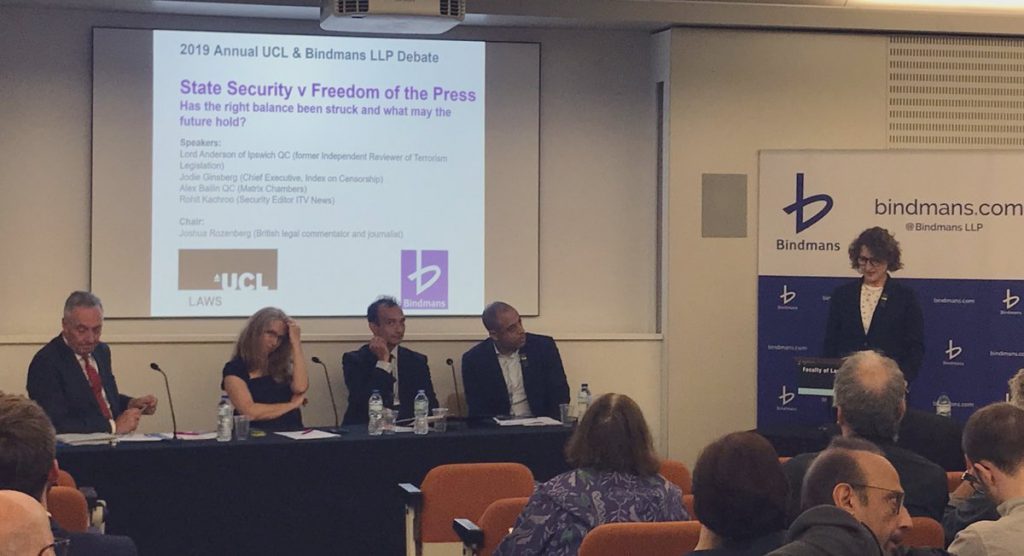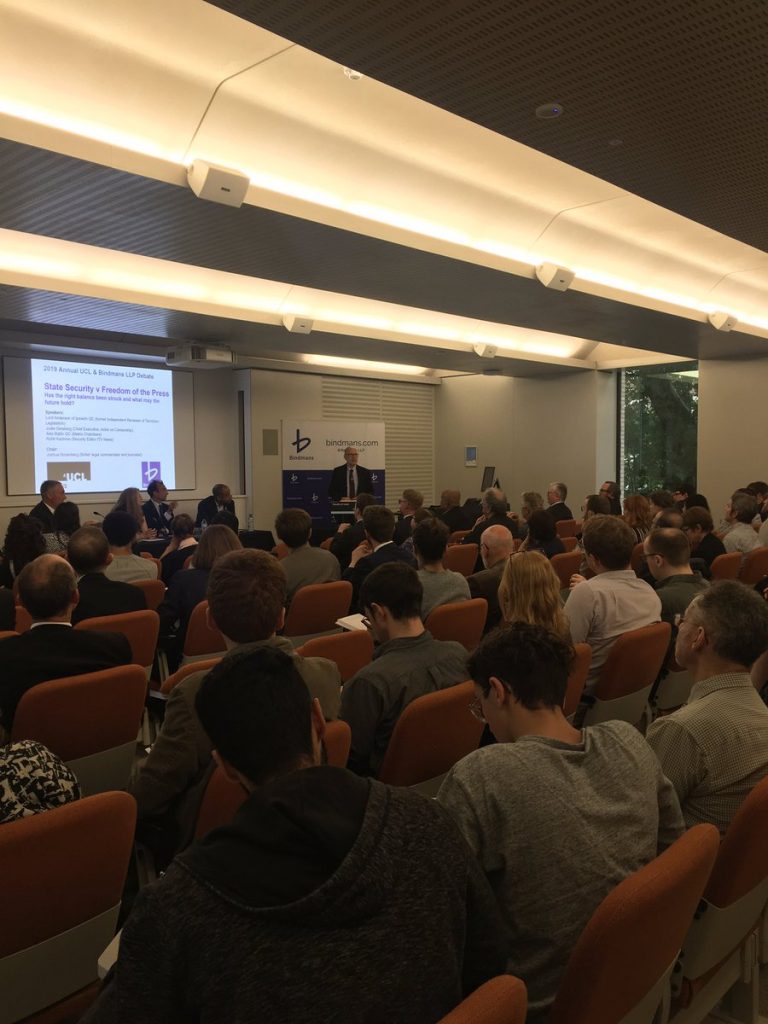13 Jun 2019 | Counter Terrorism, Event Reports, Media Freedom, Monitoring and Advocating Coverage, News and features
[vc_row][vc_column][vc_column_text]
In discussing the scope of the recent Counter-Terrorism and Border Security Act 2019, international human rights lawyer Alex Bailin QC called the powers created by the new legislation “breathtakingly broad.”
Joined by Index on Censorship CEO Jodie Ginsberg, former Independent Reviewer on Terrorist Legislation Lord David Anderson, and ITV News journalist Rohit Kachroo, Bailin parsed the new legislation and reflected on the challenges faced by journalists, particularly those reporting on terrorism, when operating within its confines.
The Counter-Terrorism and Border Security Act 2019 builds on previous counter-terrorism legislation like the Counter-Terrorism Act 2000, Counter-Terrorism Act 2008, and the Counter-Terrorism and Security Act 2015. Though it does contain a much lobbied-for carveout for journalists and academics looking at terrorist material on the internet for research purposes, the new legislation expands the range of offenses faced by citizens for viewing or even “expressing an opinion or belief that is supportive of terrorism and being reckless as to whether the audience may thereby be encouraged,” Bailin noted. He continued that to him, “that does seem like thought crime.”
A key problem with the legislation, noted several panellists, was the definition of journalism itself. While all in attendance were grateful that a journalistic carveout to the new legislation exists, each noted that journalism is no longer practiced in such a way that it is easy to discern who is a journalist and who is not.
“Everyone can see that it makes sense to include in some circumstances bloggers or people who reach a big audience through their tweets,” said Lord Anderson. However, he noted that if people who use informal blogs or social media to whistleblow are included in the journalistic carveout, the carveout would essentially include all citizens who are capable of doing so–which would entail it including all citizens. “This diminishes the necessity of a special protection for journalists at all,” he concluded. Bailin brought up famous leaks like the Pentagon Papers or Julian Assange and Wikileaks as moments when the line between private citizens and journalists has become blurred, but when protection of leakers has been essential.
Even in the case of traditional journalism, the new law could be harmful. Whistleblowing organised crime is essential, said Ginsberg, but it puts journalists at risk if police become involved. “If you’re whistleblowing on organised crime and you think the journalist you’re speaking to is not protecting you,” she said, “you might choose to take out that journalist.”

Kachroo explained that journalists refusing to co-operate with law enforcement in order to protect their sources, which sometimes come from deep within organisations like al-Qaeda, does not mean that journalists are pro-terrorism or should be prosecuted as such. Rather, source protection ensures that journalists maintain relationships within crime organisations and not endanger the people who help to undercut them, which could be thwarted by police intervention.
“We’re not on the side of terrorists because we don’t take sides, but that works both ways. We’re not working hand in hand with the state and we cannot be seen to be working hand in hand with the state,” he said. With legislation like the Counter-terrorism and Border Security Act 2019, he said that “there’s a sense of being co-opted into the police’s work, unwillingly, because of the increased use of production orders.”
Not only does this endanger the lives of journalists, but it defeats the purpose of journalism itself. What is investigative journalism if not the quest to uncover corruption wherever it might appear, even and especially if in the government itself? “One of the key roles that journalism plays within a democracy is to expose wrongdoing,” Ginsberg explained. By the end of the discussion, it was unclear if, in the presence of increasingly powerful terrorist legislation, journalism will continue to be able to serve that purpose.[/vc_column_text][/vc_column][/vc_row][vc_row][vc_column][vc_basic_grid post_type=”post” max_items=”4″ element_width=”6″ grid_id=”vc_gid:1560431923506-48684960-a6ff-1″ taxonomies=”8996″][/vc_column][/vc_row]
13 Jun 2019 | Index in the Press
Local and regional newspapers have dwindled all across the U.S. as print advertising revenues have shrunk. But the U.S. isn’t alone – there is a local news crisis happening all around the world. Read in full.
13 Jun 2019 | Index in the Press
Seven international press freedom and human rights organisations have called on EU leaders from France, Greece, Italy, Portugal, Cyprus and Spain currently in Malta for the South EU Summit to “address the ongoing impunity in the case of assassinated journalist Daphne Caruana Galizia”. Read in full.
12 Jun 2019 | Events
[vc_row][vc_column][vc_column_text]Social media platforms wield immense control over the information we see online. With rising pressure from governments; and increasing reliance on algorithms, social media platforms are in danger of silencing millions of activists and marginalised groups across the world with content takedowns and blocked accounts.
You are invited to hear the views from our panellists and take part in a discussion that will shape ARTICLE19 campaign.
Our vision for the campaign is to safeguard freedom of expression online. This cannot be achieved without better accountability and transparency. We will be calling on social media platforms to respect due process guarantees and create clear and transparent mechanisms to enforce such guarantees. Some questions we will be discussing include:
● How content takedown and account deactivation is affecting activism?
● What is the scale of the problem and its impact on free speech?
● What is the role of authorities for content takedown on social media platforms?
● What can be done to improve accountability and transparency online?
● What can the campaign do to amplify voices of those seeking change?[/vc_column_text][vc_custom_heading text=”Panelists” font_container=”tag:h3|text_align:left” use_theme_fonts=”yes”][vc_row_inner][vc_column_inner width=”1/2″][vc_single_image image=”107205″ img_size=”full”][vc_column_text]Thomas Hughes has been executive director of ARTICLE 19 since 2013. For the past two decades, Hughes has worked on human rights and media development issues, including as deputy director of International Media Support (IMS) between 2005 and 2010, as well as previously for the United Nations, European Commission and Organisation for Security and Cooperation in Europe (OSCE).[/vc_column_text][/vc_column_inner][vc_column_inner width=”1/2″][vc_single_image image=”107204″ img_size=”full”][vc_column_text]Jennifer Robinson is a barrister in London. Her practice focuses on international law, free speech and civil liberties. She advises media organisations, journalists and whistle-blowers on all aspects of media law. Robinson serves as a trustee for the Bureau for Investigative Journalism, and sits on the advisory board of the European Center for Constitutional and Human Rights and the Bonavero Human Rights Institute at the University of Oxford.[/vc_column_text][/vc_column_inner][/vc_row_inner][vc_row_inner][vc_column_inner width=”1/2″][vc_single_image image=”107206″ img_size=”full”][vc_column_text]Pavel Marozau is a civic and internet activist. He was under politically motivated persecution by the Belarusian authorities for producing satirical animated films casting president Lukashenko, being accused of slandering the Belarusian president. During the Geneva Summit, Marozau founded a network of activists from Iran, Burma, Venezuela, Cuba, Zimbabwe, and Egypt, as well as a founder of counter-propaganda web-television ARU TV.[/vc_column_text][/vc_column_inner][vc_column_inner width=”1/2″][vc_single_image image=”107207″ img_size=”full”][vc_column_text]Paulina Gutiérrez is an international human rights lawyer and internet freedom advocate in Latin America. She holds a degree in law and another one in international relations. During the last four years, Gutiérrez designed and developed the digital rights agenda for ARTICLE19 Mexico and Central America Regional Office. She’s also a member of INDELA’s Advisory Board and BENETECH’s Human Rights Program Advisory Board.[/vc_column_text][/vc_column_inner][/vc_row_inner][vc_column_text]
When: Thursday 20 June 5:30-10pm
Where: The Law Society’s Hall, 113 Chancery Lane, London WC2A 1PL
Tickets: Free. Registration required via Eventbrite
[/vc_column_text][vc_column_text]Presented in partnership with[/vc_column_text][vc_row_inner][vc_column_inner width=”1/4″][vc_single_image image=”60288″ img_size=”full”][/vc_column_inner][vc_column_inner width=”1/4″][/vc_column_inner][vc_column_inner width=”1/4″][/vc_column_inner][vc_column_inner width=”1/4″][/vc_column_inner][/vc_row_inner][/vc_column][/vc_row]


